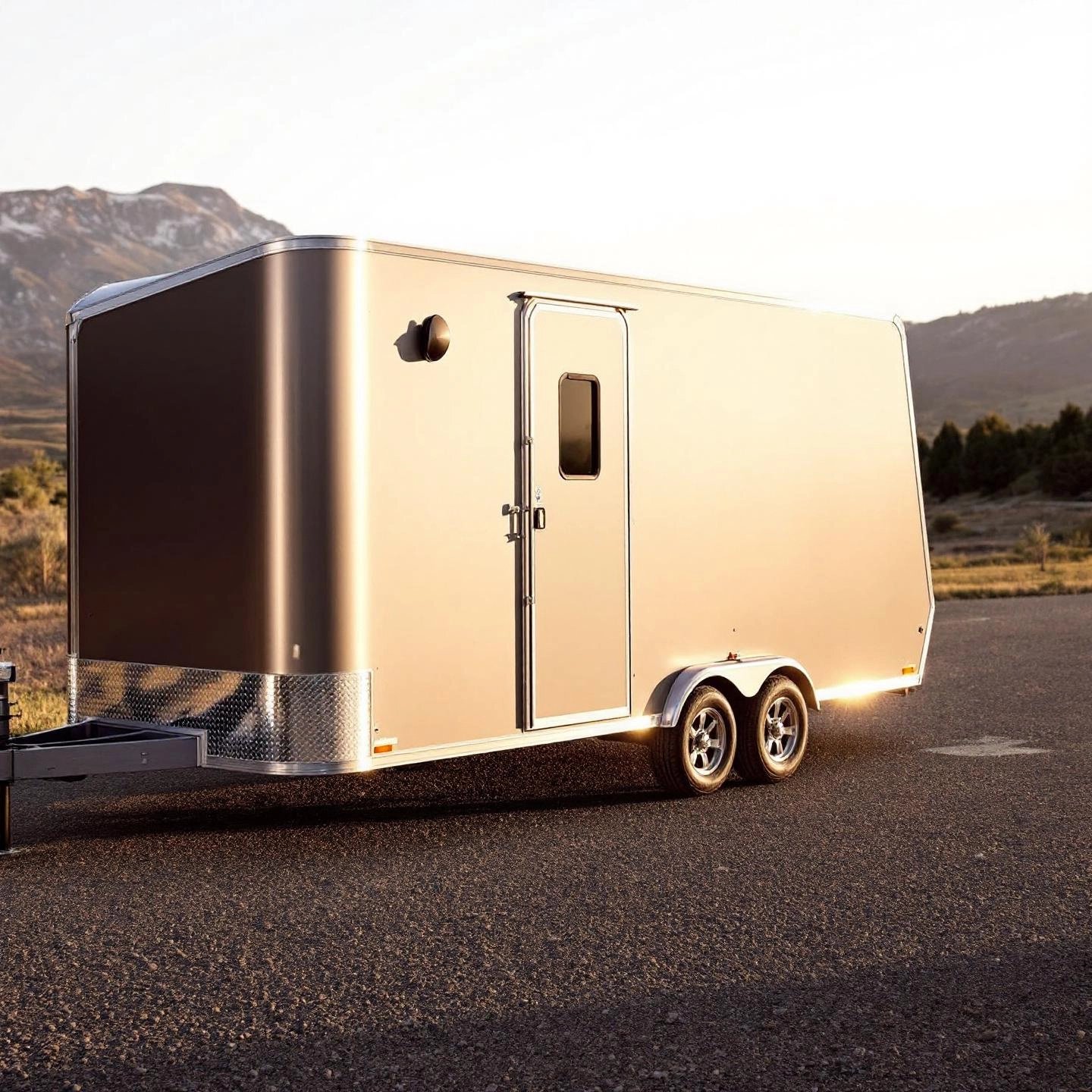
Ever wondered why you’re seeing more aluminum trailers on highways, at construction sites, and even in your neighbor’s driveway? The answer is simple: today’s haulers want a lightweight, rust-resistant, and long-lasting solution for transporting everything from ATVs to building materials. If you’ve ever struggled with a heavy steel trailer or spent weekends dealing with rust and repairs, you’re not alone. Many buyers are turning to aluminum trailers as the modern answer for both commercial and personal hauling needs.
Let’s start by looking at the core issues with traditional steel trailers. While steel is undeniably strong, it comes with drawbacks:
Enter the aluminum trailer—a game changer in the world of hauling. Unlike steel, aluminum is naturally resistant to corrosion and significantly lighter in weight. This means you can tow more cargo with less strain on your vehicle, and you’ll spend less time worrying about rust or ongoing maintenance. In fact, the U.S. market is seeing strong growth in demand for aluminum trailers, thanks to their versatility in both recreational and commercial applications, from camping and boating to construction and logistics. Major manufacturers are rolling out new models to meet this growing need, making it easier than ever to find an aluminum trailer for sale that fits your lifestyle or business requirements.
But what exactly makes aluminum trailers so popular, and how do you choose the right one? In this comprehensive guide, we’ll break down:
By the end of this article, you’ll be equipped with the knowledge and confidence to make an informed decision on your next trailer purchase. Whether you’re searching for a lightweight solution for weekend adventures or a durable workhorse for your business, understanding the advantages of aluminum trailers is the first step toward smarter, hassle-free hauling.
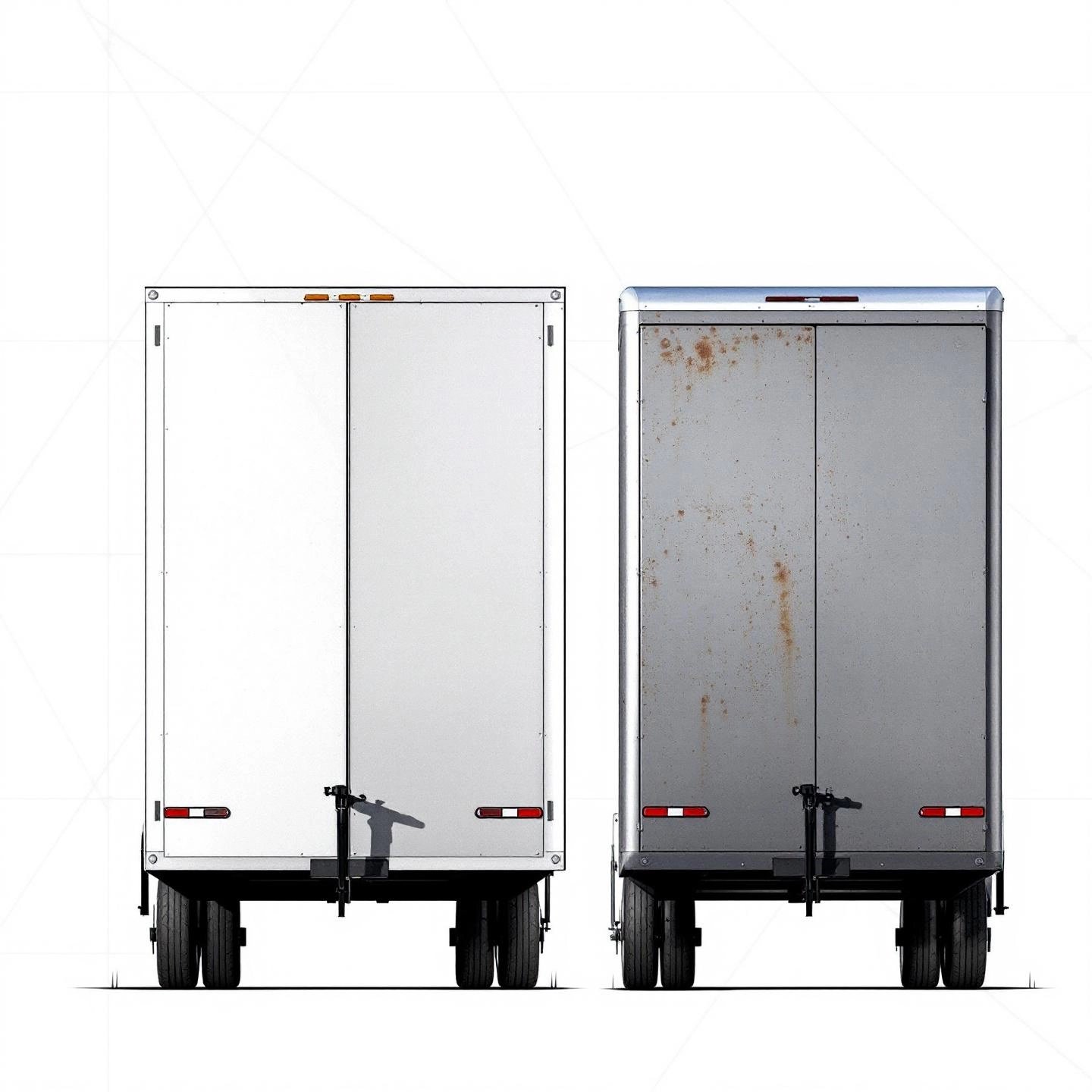
When you’re weighing the pros and cons of trailer materials, the debate often comes down to one question: aluminum trailer vs steel—which is the better long-term investment? Imagine you’re planning to haul equipment, recreational vehicles, or supplies for years to come. You want a trailer that delivers not just today, but for the long haul. Let’s break down why choosing an aluminum utility trailer is more than just a trend—it’s a smart, value-driven decision that pays off in both convenience and cost savings.
At first glance, a steel trailer might seem more budget-friendly. But take a closer look, and you’ll see that aluminum trailers offer significant financial advantages over time:
Beyond the dollars and cents, aluminum utility trailers stand out for their everyday practicality. Here’s what you’ll notice when you make the switch:
| Feature | Aluminum Trailer | Steel Trailer |
|---|---|---|
| Weight | Lightweight, easy towing | Heavy, requires more powerful vehicle |
| Maintenance | Low, no rust-proofing needed | High, needs regular rust prevention |
| Resale Value | Typically higher | Depreciates faster |
| Corrosion Resistance | Excellent (won’t rust) | Poor (prone to rust) |
| Fuel Economy | Better (less weight) | Lower (more weight) |
When you add up the financial and practical benefits, it’s easy to see why so many haulers are making the switch to aluminum. Whether you’re looking for an aluminum utility trailer for weekend projects or a reliable workhorse for your business, investing in aluminum means fewer headaches and more value over time. Next, let’s explore the different types of aluminum trailers and how to choose the right one for your specific needs.
When you picture a trailer that can handle almost any hauling job—whether it’s moving your ATV up north, transporting lawn equipment for a landscaping business, or helping with a big home improvement project—you’re likely thinking of an aluminum utility trailer. But what exactly makes this trailer type so popular, and how do you know which style fits your needs best?
Simply put, an aluminum utility trailer is a lightweight, corrosion-resistant trailer designed for everyday hauling tasks. Unlike steel trailers, these are built primarily from aluminum, making them easier to tow, less prone to rust, and far simpler to maintain over the years. Their versatility and durability have made them a favorite for both DIY homeowners and professionals alike.
One of the biggest draws of an aluminum utility trailer is its ability to tackle a wide range of jobs. Imagine this scenario: it’s spring, and you’re ready to clean up your yard, haul mulch from the garden center, or move your riding mower for a tune-up. An aluminum lawn mower trailer—a specific type of utility trailer—makes these tasks a breeze. But that’s just the beginning. Here are some common uses:
With the right trailer, you’ll find yourself tackling projects you might have otherwise put off, thanks to the ease and reliability of aluminum construction.
Not all utility trailers are created equal. The right style can make your hauling experience smoother and safer. Let’s break down the main options:
| Type | Best For | Key Features | Example Use |
|---|---|---|---|
| Open Utility Trailer | General hauling, yardwork, bulky items | Lightweight, easy access, tie-down points | Moving mulch, hauling a riding mower |
| Enclosed Utility Trailer | Weather-sensitive or valuable cargo | Full walls/roof, lockable, secure | Transporting electronics, tools, or motorcycles |
| Single Axle | Light to moderate loads, easier maneuvering | Lower weight, simple design | Hauling gardening tools |
| Tandem Axle | Heavier loads, smoother ride | Greater stability, higher payload | Transporting construction equipment |
| Ramp/Gate Options | Loading/unloading wheeled equipment | Fold-down ramps, removable gates | Rolling on ATVs or mowers |
For example, if you regularly haul a riding mower, a single-axle open trailer with a fold-down ramp is a practical choice—simple, affordable, and easy to store. If you’re transporting expensive tools or want to keep cargo dry, an enclosed model with lockable doors adds peace of mind and weather protection.
Sounds complex? It doesn’t have to be. Start by listing your most common hauling tasks. Do you need to move landscaping equipment every weekend, or just haul debris a few times a year? Will you be carrying heavy construction materials, or mostly lighter loads? Once you know your priorities, you can narrow down the size, axle type, and features that matter most.
As you continue through this guide, you’ll learn how to match your hauling needs to the perfect trailer size and configuration, ensuring your investment in an aluminum utility trailer pays off for years to come.
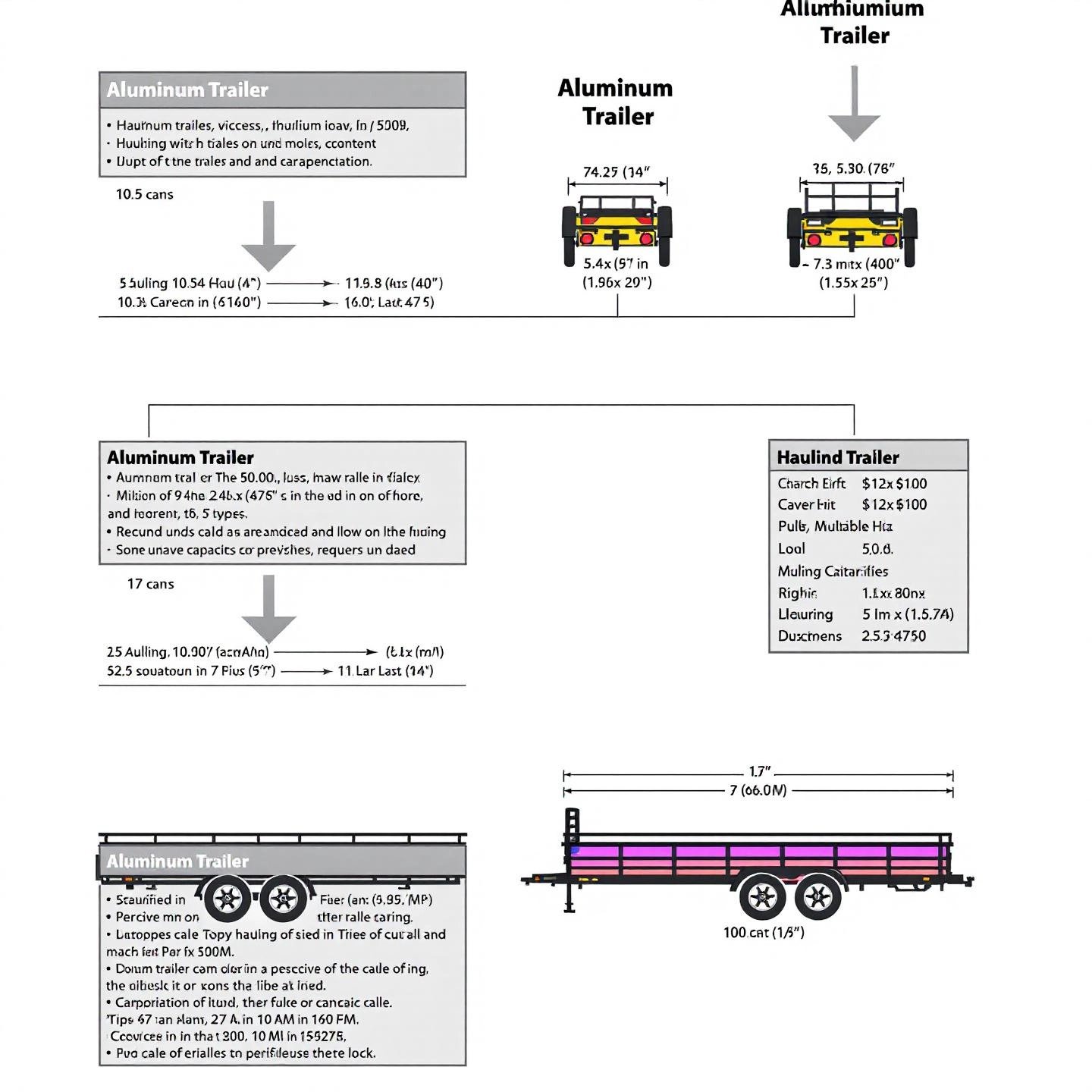
When it comes to choosing an aluminum trailer, one size does not fit all. Have you ever loaded up your trailer only to realize you’re a few inches short—or that you bought more trailer than you’ll ever use? Selecting the proper size and configuration is key to safe, efficient hauling, and it all starts with a few simple questions: What are you hauling? How heavy is it? And what can your vehicle handle?
Imagine you’re planning to haul a riding mower, a couple of ATVs, or maybe even a car. Each job has different space and weight needs. Start by listing the items you’ll transport most often. For example, a single lawn mower might fit perfectly on an aluminum trailer 5x8, but if you’re moving a small car, you’ll need something closer to a 16ft aluminum trailer.
Let’s break down some of the most common aluminum trailer sizes and what they’re best suited for:
| Trailer Size | Typical Use | Recommended Axle Type | Notes |
|---|---|---|---|
| 5x8 ft | Single riding mower, small ATV, garden equipment | Single axle (3,500 lb) | Great for homeowners, easy to store |
| 6x12 ft | Multiple ATVs, motorcycles, small furniture moves | Single or tandem axle (3,500–5,200 lb) | More capacity, still maneuverable |
| 7x14 ft | Construction materials, multiple mowers, medium-sized UTVs | Tandem axle (5,200 lb) | Ideal for landscaping or light commercial use |
| 16x7 or 16x8 ft | Cars, large equipment, bulkier cargo | Tandem axle (5,200–7,000 lb) | Common for car haulers, heavy-duty jobs |
Remember, these are general guidelines. Always check your specific cargo dimensions and weight to ensure a safe fit.
Before you fall in love with a large trailer, take a look at your tow vehicle’s manual. Your vehicle’s towing capacity must account for both the trailer’s weight and your fully loaded cargo. Here’s how to make sure you’re within safe limits:
Where will you keep your trailer when not in use? A 5x8 ft trailer can fit in most standard garages, while a 16ft aluminum trailer will need more outdoor space. Also, think about how easily you can back up, turn, or park the trailer—smaller sizes are easier for tight spaces.
Axle choice can seem technical, but it’s actually straightforward when you focus on your needs:
Still not sure? If you plan to grow your hauling needs or want more flexibility, going slightly larger or opting for a tandem axle can save you the hassle of upgrading later.
| Hauling Task | Recommended Trailer Size | Suggested Axle Type |
|---|---|---|
| Lawn mower, garden tools | 5x8 ft | Single axle |
| ATVs, motorcycles | 6x12 ft | Single/tandem axle |
| Cars, large equipment | 16x7 or 16x8 ft | Tandem axle |
| Construction materials, multiple mowers | 7x14 ft | Tandem axle |
Choosing the right aluminum trailer is all about matching your needs to the right size and configuration. By carefully considering your loads, tow vehicle, and storage options, you’ll set yourself up for years of safe, efficient hauling. Next, we’ll take a closer look at why aluminum itself is such a standout material for trailer construction—and how it impacts performance and longevity.
When you’re investing in an all aluminum trailer, you’re not just choosing a lighter alternative—you’re tapping into the power of advanced material science. But what exactly makes aluminum such a standout performer for trailers? Let’s break it down with real-world examples and practical explanations that make the science easy to understand.
Ever wondered how something so light can be so strong? Aluminum’s secret lies in its exceptional strength-to-weight ratio. Pound for pound, modern aluminum alloys used in trailers are as strong—or sometimes even stronger—than steel. This means you get a trailer that’s sturdy enough for heavy loads, but light enough to tow with less effort. Imagine hauling your equipment or car with a trailer that weighs about 35% less than its steel counterpart. The result? Easier maneuvering, better fuel economy, and reduced wear on your tow vehicle.
Rust is the enemy of any trailer owner, especially if you live in a humid or coastal region. Here’s where aluminum truly shines. When exposed to air, aluminum forms a thin, invisible layer of aluminum oxide. This natural barrier protects the metal beneath from moisture and salt, making aluminum for trailers the go-to choice for long-lasting durability.
Sounds complex? It’s actually a game-changer for trailer design. The extrusion process involves heating a solid block of aluminum and pressing it through a die to create strong, precisely shaped profiles. This method allows manufacturers to:
For example, extruded aluminum beams can be reinforced in high-stress areas, and the flexibility of aluminum helps absorb vibrations and shocks from the road—reducing the risk of cracks or frame fatigue over time.
Not all aluminum trailers are created equal. The true performance and longevity of an all aluminum trailer depend on the quality of the raw material and the precision of the manufacturing process. Industry leaders like Shengxin Aluminum provide high-grade, precision-engineered aluminum profiles that set the standard for trailer integrity and durability. Their advanced extrusion lines and strict quality controls ensure that every profile delivers the strength, corrosion resistance, and consistency you need for safe, reliable hauling.
"When you choose a trailer built with top-tier aluminum profiles, you’re investing in years of trouble-free performance and peace of mind on the road."
Understanding the material science behind aluminum helps you see why it’s the smart choice for modern trailers. Next, we’ll guide you through the market so you know where to find the best aluminum trailers for your needs.
Ready to start your search for the perfect aluminum trailer? With so many options, price points, and sellers out there, it can feel overwhelming—especially if it’s your first time. Should you buy new or used? Where can you find the best deals on aluminum utility trailers for sale? And does timing really matter? Let’s break it down step by step so you can shop with confidence and avoid common pitfalls.
Before you dive into listings, ask yourself: do you want a brand-new trailer with all the latest features, or are you open to a gently used option that might save you money? Each path has its own set of pros and cons. Consider this comparison:
| New Aluminum Trailer | Used Aluminum Trailer | |
|---|---|---|
| Pros |
|
|
| Cons |
|
|
Think about your budget, how long you plan to keep the trailer, and whether you need specific features. If reliability and customization are top priorities, new might be the way to go. But for many, the value of a well-maintained used trailer is hard to beat.
Once you know what you want, it’s time to start shopping. Here are the main places to look for aluminum trailer sales:
Tip: If you’re looking for a specific size or feature, use search filters or contact dealers directly to check availability. Some of the best deals on aluminium trailers for sale are found by reaching out before the busy season starts.
Did you know that when you buy can be just as important as where you buy? Dealers often offer discounts and promotions during the off-season—typically in winter or at the end of the year, when they’re looking to clear out inventory. If you can wait, shopping during these months may help you score a better price. On the other hand, if you need a trailer immediately or have your eye on a specific model, you might find more selection during the busy season, though prices could be higher.
Think about your timeline and flexibility. If you’re not in a rush, waiting for end-of-year sales or off-season promotions can stretch your budget further.
Shopping for an aluminum trailer doesn’t have to be stressful. By weighing your new vs. used options, knowing where to look, and timing your purchase wisely, you’ll be well on your way to finding the right trailer at the right price. Next, let’s dive into the essential features you should inspect before making your final decision—so you can buy with confidence and peace of mind.
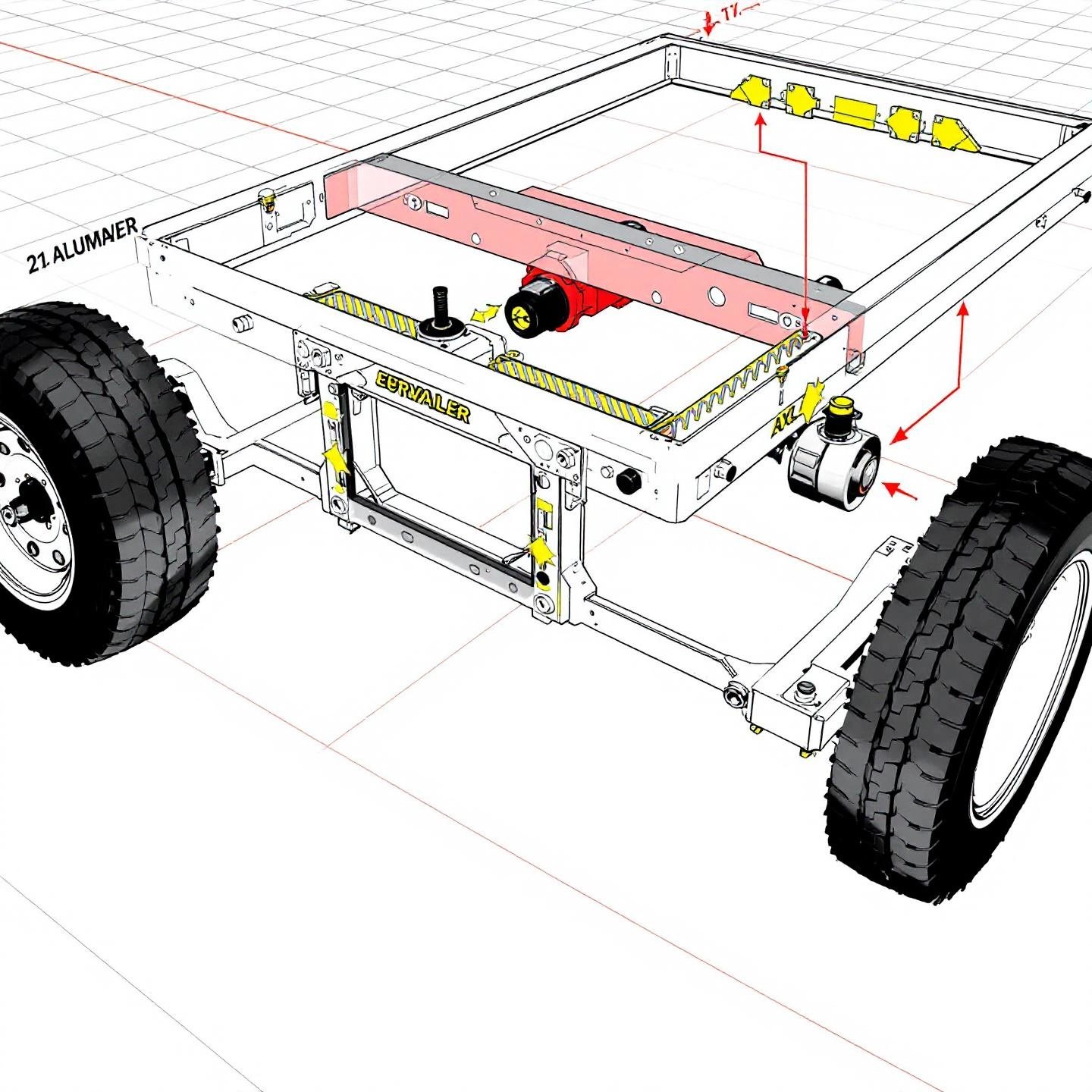
When you’re standing in front of a shiny new (or gently used) aluminum trailer, it’s tempting to focus on the big picture—size, price, and curb appeal. But what really matters are the details beneath the surface. How do you know you’re investing in a trailer that will go the distance, regardless of the brand? Let’s break down the key features you should check before making your purchase, so you can confidently compare aluminum trailer brands and models.
Think of the frame as your trailer’s skeleton—it needs to be strong, precise, and free of weak points. Start your inspection here:
Ever had a flat tire or bumpy ride ruin your plans? These components are crucial for smooth, safe towing:
Your trailer’s floor endures the brunt of every haul. Which decking is best?
Inspect for loose boards, corrosion around fasteners, or soft spots—these can signal costly repairs down the road.
It’s easy to overlook wiring, but it’s essential for safety and compliance:
Ever wondered why some trailers outlast others, even with similar specs? The answer often lies in the quality of the aluminum extrusions used for the frame and key components. Advanced extrusion technology—like that offered by Shengxin Aluminum—ensures precise, consistent profiles that resist bending, cracking, and corrosion. This means:
"Choosing a trailer built with expertly engineered aluminum extrusions is like investing in peace of mind—your trailer is built to last, mile after mile."
| Feature | What to Look For | Why It Matters |
|---|---|---|
| Frame & Welds | Smooth, even welds; straight beams; no corrosion | Structural integrity and safety |
| Axles & Suspension | No sagging, rust, or uneven wear | Safe, stable towing |
| Tires | Good tread, no cracks, proper inflation | Reliability on the road |
| Decking | Solid, no rot or corrosion, secure fasteners | Long-lasting performance |
| Electrical | Working lights, secure wiring, functional accessories | Safety and legal compliance |
By following this checklist and understanding the value of premium materials, you’ll be well-equipped to choose a trailer that’s both safe and built to last. Next, we’ll look at how to find reputable dealers, so you can shop with confidence and get the support you deserve throughout your ownership journey.
When you’re ready to buy, the next big question is: how do you find an aluminum trailer dealer you can trust? Imagine you’ve done your research, picked your perfect model, and now just need a reliable partner to make your purchase smooth and stress-free. Sounds simple, but with so many dealers out there—both local and online—it pays to know what separates the best from the rest.
Would you trust a dealer with dozens of glowing reviews, or one with a string of one-star complaints? Reputation is your first filter. Begin by searching for “aluminum trailer near me” and check out customer reviews on Google, Facebook, and industry-specific sites. Don’t just look at the star rating—read the comments. How does the dealer respond to negative feedback? A willingness to address problems signals a commitment to customer satisfaction.
A reputable dealer should stock a wide variety of models and brands. Ask if you can tour their lot or browse their online inventory. The ability to see and touch different trailers in person helps you avoid surprises later on. If you’re looking for a specific feature—like a tandem axle or custom ramp—ask if they can source or customize it for you.
Ever tried calling a business and been left on hold forever? Good customer service is about more than a friendly smile—it’s about responsiveness and expertise. Call the dealer with a few questions about maintenance, registration, or delivery options. How quickly and thoroughly do they answer? This is a strong indicator of the support you’ll receive after your purchase.
Before signing anything, clarify what’s covered under warranty and what service options are available. Reputable dealers will provide written details about manufacturer warranties, return policies, and compliance with legal standards. Ask for a quick compliance checklist to ensure your trailer is road-legal from day one.
| What to Check | Why It Matters |
|---|---|
| Customer reviews and ratings | Reveals dealer’s reputation and real-world experiences |
| Inventory variety and brands offered | Ensures you have choices and access to current models |
| Transparency in pricing | Helps you avoid hidden fees and surprises |
| Responsiveness of customer service | Indicates level of support before and after the sale |
| Warranty and service policies | Protects your investment for the long haul |
| Legal compliance and delivery options | Ensures your trailer is safe, road-ready, and can be delivered to your location |
Taking the time to vet your aluminum trailer dealer pays off with peace of mind and a smoother ownership experience. Once you’ve found a trustworthy partner, you’ll be ready to compare your top trailer choices and make your final decision with confidence. Up next, let’s look at how to compare models side by side so you can choose the trailer that fits your needs—and your budget—perfectly.
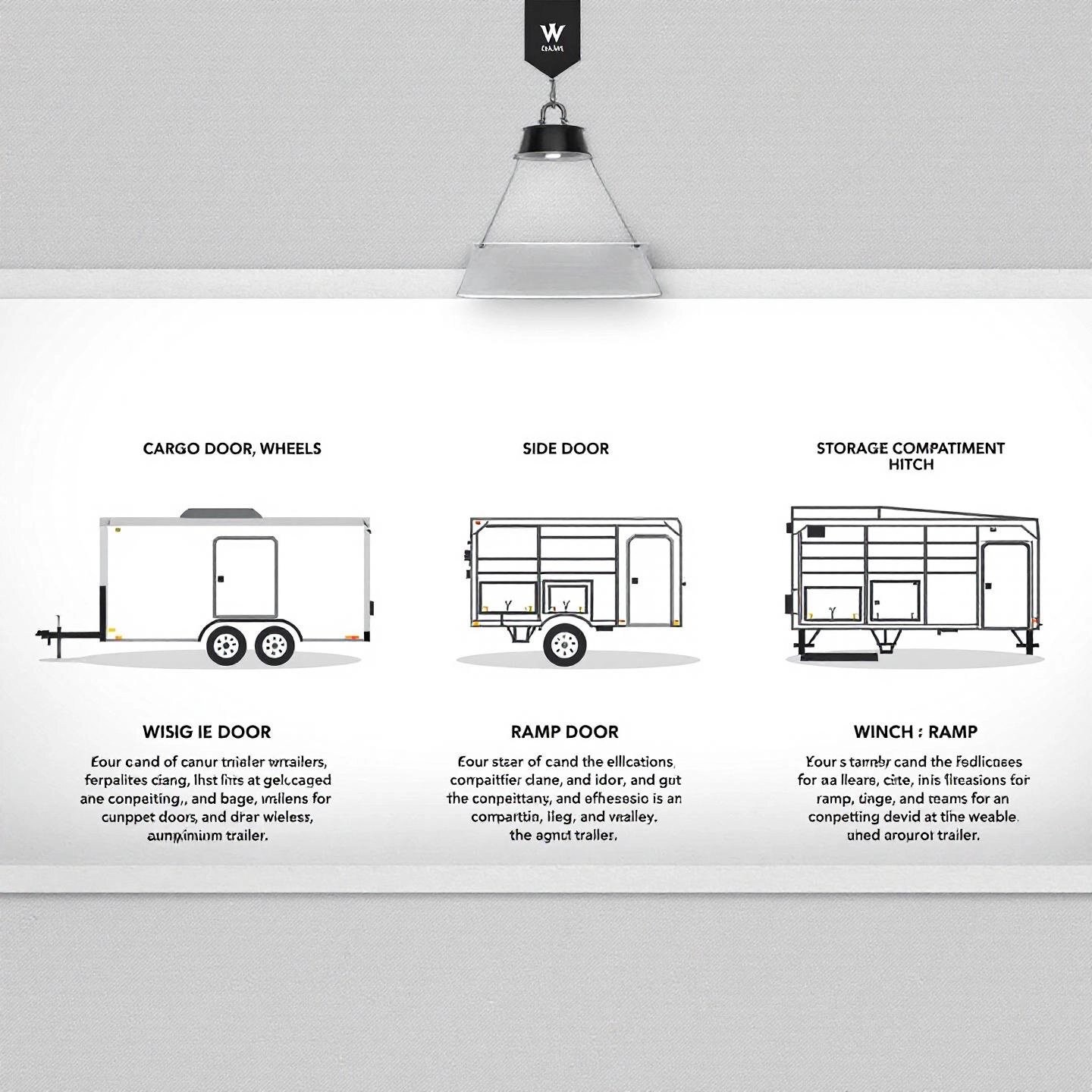
So, you’ve narrowed your options down to a few standout aluminum trailers—maybe you’re eyeing a lightweight car hauler, a versatile utility trailer, or a gently used aluminum trailer for sale that seems like a bargain. But how do you make the final call? When every choice looks good on paper, it’s time to get systematic and hands-on. Here’s how to compare your top contenders and ensure you drive away with the trailer that truly fits your needs.
Sounds tedious? Actually, organizing your choices in a simple table makes differences jump out at a glance. Here’s what you’ll want to include for each model:
| Model | Price | Size/Capacity | Key Features | Warranty | Build Quality |
|---|---|---|---|---|---|
| Aluminum Trailer Car Hauler A | $7,800 | 16ft, 7,000 lbs | Removable ramps, LED lights, tandem axle | 5 years | Welded box frame, extruded aluminum deck |
| Utility Trailer B (Used) | $4,200 | 6x12ft, 3,500 lbs | Fold-down gate, spare tire, single axle | None (used) | Well-maintained, minor scratches |
| Enclosed Cargo Trailer C | $9,950 | 7x14ft, 5,200 lbs | Side door, roof vent, interior lighting | 3 years | Seamless aluminum panels, reinforced roof |
Customize your table with the models you’re considering. Include any details that matter to you—like ramp style, deck material, or special accessories. This approach is especially useful when comparing aluminum trailer car haulers or deciding between new and used aluminum trailers for sale.
Numbers and features are important, but nothing beats seeing a trailer up close. Here’s what to do during your walk-around:
For used aluminum trailers for sale, be extra thorough—check for hidden rust, water damage, or signs of hard use. Ask for maintenance records and, if possible, take a short test tow to see how the trailer handles.
After comparing specs and doing your in-person checks, you might still be torn. This is where your gut comes in. Ask yourself:
Remember, the best trailer isn’t always the cheapest or flashiest—it’s the one that matches your hauling needs, fits your budget, and gives you peace of mind every time you hitch up. If you’ve done your homework, listened to your instincts, and taken the time to compare, you’re ready to make a confident, informed decision.
With your choice made, you’re just one step away from enjoying years of reliable hauling. In the final section, we’ll recap the journey and show you how to get the most value from your aluminum trailer investment for the long haul.
Imagine this: you’re pulling into your driveway after a long haul, and your trailer still looks and performs like new—no rust, no sagging, no unexpected repairs. That’s the peace of mind an aluminum trailer delivers, and it’s why more buyers are making the switch every year. As you wrap up your search, let’s recap what makes these trailers the gold standard for modern hauling—and how to ensure you get the highest value from your investment.
Ready to take the next step? Here’s a quick checklist to guide you through a confident buying process:
| Step | What to Do |
|---|---|
| 1. Assess Your Needs | List your typical cargo, hauling frequency, and storage space. This helps you zero in on the right trailer size and features. |
| 2. Research Materials & Features | Understand the benefits of aluminum construction, axle types, deck materials, and key features that matter for your tasks. |
| 3. Find a Reputable Dealer | Look for trusted aluminum trailer brands and dealers with positive reviews, transparent policies, and knowledgeable staff. |
| 4. Inspect Thoroughly | Check welds, frame quality, suspension, tires, and electrical systems. Don’t hesitate to ask for documentation or take a test tow. |
Here’s a final tip that can make all the difference: not every aluminum trailer is built the same. The true longevity and performance of your trailer depend on the quality of the aluminum profiles at its core. Choosing a model built with high-grade, precision-engineered profiles—like those from Shengxin Aluminum—means your trailer is designed to withstand years of heavy use, harsh weather, and tough road conditions. Shengxin’s advanced extrusion technology and strict manufacturing standards set the benchmark for reliability and safety in the industry.
“A smart trailer investment isn’t just about the upfront price—it’s about choosing materials and brands that deliver value mile after mile.”
In summary, an aluminum trailer offers a winning combination of lightweight handling, lasting durability, and rust-free protection—all backed by a strong resale market and lower lifetime costs. By following the steps in this guide and prioritizing quality materials, you’re not just buying a trailer—you’re securing years of trouble-free hauling and peace of mind.
Ready to experience the difference? Choose an aluminum trailer built with premium profiles from trusted suppliers like Shengxin Aluminum and enjoy maximum performance and longevity for every haul ahead.
Aluminum trailers offer significant benefits such as lighter weight for easier towing, superior resistance to rust and corrosion, lower maintenance, and higher resale value. These features make them ideal for both commercial and personal hauling, especially in harsh weather conditions.
Start by listing your typical cargo, measuring its dimensions and weight, and assessing how often you'll use the trailer. Match these needs with common trailer sizes—like 5x8 ft for small equipment or 16ft for larger loads—and check your vehicle's towing capacity to ensure compatibility.
Yes, modern aluminum trailers use advanced alloys and extrusion processes, providing excellent strength-to-weight ratios. When built with high-quality profiles, such as those from Shengxin Aluminum, they withstand demanding loads and frequent use while remaining lightweight and rust-free.
Inspect the frame and weld quality, check axles and suspension, ensure tires are in good condition, review decking material for damage, and test all electrical and lighting systems. High-quality aluminum extrusions are essential for durability and safety.
Look for authorized dealers with strong customer reviews, a wide inventory, and transparent warranty policies. Comparing local and online options, and evaluating service quality, helps ensure you buy from a trustworthy source.
 Інтернет-сервіс
Інтернет-сервіс 0086 136 3563 2360
0086 136 3563 2360 sales@sxalu.com
sales@sxalu.com +86 136 3563 2360
+86 136 3563 2360